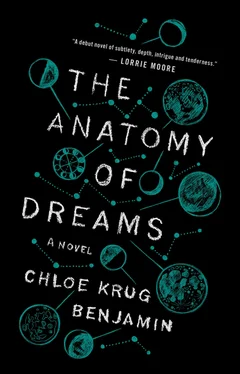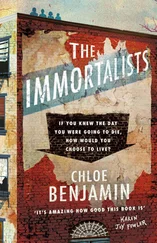“You’ve found me,” he says, “how sly of you”—and now he is opening the door all the way, ushering me into a front hall filled with the fading natural light of afternoon and the dank smell of soil.
“I should have given you warning.”
“No, no, that’s all right. You’ve every right to surprise me.”
But he doesn’t look surprised. He is, I can tell, in one of his lighthearted moods. I expected him to be caught off guard, to ask me why I’ve come. Instead, he is playing host, as though I’m simply an old friend who has stopped by on the way elsewhere.
“Sylvia,” he says again, leading me into the living room. “What a pleasure. Can I get you a drink? Water? Or something else?”
“Water is fine.”
This side of the house is mostly in shadow. He walks through a low entryway into the kitchen, and from there he flicks on a light that brings the living room into view. There is a small brown couch, a reclining chair, and an old table piled with books. Everywhere else, though, are plants: trees potted in the corners, succulents hanging from the ceiling, flowers climbing the walls. Their leaves are pungent and fleshy, grotesquely ripe. All over is the close, moist smell of growth. I can’t help it; I cover my nose with my sleeve.
Keller returns to the room and hands me a glass of water.
“So you’ve found my perennials. Gorgeous, aren’t they? They get just enough sun. I’ve never had a green thumb. But the terrific thing about succulents”—he takes a seat in the reclining chair, gesturing toward the ceiling—“is that they prefer neglect. Truly: they thrive on it.”
His affect is still one of ease. But he’s talking too much, too quickly. I see now that what I thought were the contours of the chair is actually the imprint of his body. He fits perfectly inside it, like rubber in a mold.
“I can’t stay for long,” I say. “But there are a few things I want to say first.”
Am I imagining it, or does a sudden blankness come over his face—an instinctive absence, the chalkboard wiped clean?
“First,” I say, “I don’t want to talk about Gabe.”
“Very well. He told me he tried to reach you—years ago, it must be now.”
“He wrote a note.”
“And you didn’t reply.”
It isn’t an accusation, but it’s not a question, either—just a scientist’s habit of blank-filling and estimation.
“No. I didn’t.”
He waits for me to continue. I shift on the couch, warm. Despite the weather, I’ve worn pants.
“I drove past Snake Hollow yesterday,” I say.
“I’m sorry to hear that.” He smiles. “It’s hideously changed, of course. I’d rather you be able to remember it as it was.”
“I’m sorry you sold it. It was Meredith’s, wasn’t it? Your wife’s?”
“It belonged to her family, then to her. And when she died, it belonged to me.”
“They didn’t mind when you gave it up?”
He raises an eyebrow.
“It was their suggestion, I’m afraid. Too many bad memories associated with that house—and worse, perhaps, too many good ones. They were in favor of selling it right after she died. I held on a little longer. But everything, good and bad, must come to an end.”
Keller cocks his head. His lenses flash with light.
“Does that make it less alluring to you?” he asks. “No family drama, no bitter struggle?”
Again, the clinical voice—the weighed curiosity of a professor, imbued with just the right amount of mildness. Still, I’m startled into silence. He stands and walks to the kitchen. When he returns, he holds a green watering can with a bulging belly and a thin, long spout.
“She was very much like you, in fact.” He waters the soil around a ficus, dirt splattering his hands. “Very inquisitive, especially when it came to her own mind. A touch of obsessiveness—later, of course, more than a touch of it. And the capacity for self-destruction.”
“Everyone has that capacity.”
“You’re right. But in some of us it goes unfulfilled.” He stands the watering can upright and wipes its nozzle on his apron. “Still, I wasn’t referring to your disorder. More, I would say, your inability to let go.”
“And you don’t think that’s what Meredith did?”
“My wife didn’t kill herself to let go. She did it to hold on—to life as she knew it, to herself as she was.”
The surprise is wearing off, and now I’m eager. He has given me license; I’ve wanted a fight.
“Is that why you left San Francisco? Holed up in a small town in Northern California and began to teach high school students? Or was it that they were easier to control?”
“It’s true that I left the university when my wife died.” His voice is clipped, and I can tell I’ve prodded him. “I thought I could live a quieter life at a place like Mills. But it began to feel cowardly, such an obvious lie. So I returned to my research. I tried to do it in her honor. Moving forward, all while respecting the past—it’s a delicate balance, Sylvie, and I don’t claim to have mastered it.”
“In her honor,” I say. “Or was it that you got inspired again? At Mills, you had a whole new group of subjects. Stu Cappleman. Me. You’d be nothing without your patients, but the saddest part is that you haven’t helped any of us. You want to know what Meredith and I have in common, Adrian? You. You wrenched us open and used your tools to rummage around in our minds until everything inside got squiggly and confused. It’s just like what happened to Anne March. You left us worse off than we started.”
“Oh, Sylvie.” Keller frowns in disappointment, as though I’ve failed an easy test. “That’s very simplistic. I thought I’d at least taught you that life is never so black and white. Besides, look at you now. You’re, what—thirty years old? You went back to school. You seem to be thriving.”
“Which has nothing to do with you. Those were my accomplishments.” I pause. “And how did you know?”
“I’ve followed your success. You spoke at the ceremony, didn’t you?”
The year I finished my undergraduate degree, I was asked, along with two other nontraditional students, to give a speech at the commencement ceremony. The university wanted us to paint them as a progressive institution, embracing of difference and alternative paths. The fact that Keller can still follow me, however benignly, triggers the paranoia that sits under my skin like an implant.
“Don’t worry,” he says. “No bugs. I saw an article in the Chronicle . I meant to write to Mills, in fact. I thought your story might be of interest to the alumni quarterly.”
“I’m glad you didn’t. My story isn’t yours to hand out.”
Keller opens his mouth as if to speak, then closes it again. He looks at his lap, his lips pursed in what is either a gesture of contemplation or a small smile. I wonder, suddenly, if he’s slipping, his mind fraying with age. In that case, it could be difficult to get much from this visit at all.
“Sylvie,” he says quietly. Then he stands, wipes his hands on his apron, and walks toward the kitchen. “Can I get you anything else? Something to eat? A piece of fruit?”
“I won’t be staying long.”
He waits in the doorway to the kitchen.
“Fine. A piece of fruit.”
He returns with an apple and places it on the table in front of me. Then he settles back into the recliner again.
“I’ve been afraid of this,” he says. “Afraid you’d come to me. Not for my sake—you can ask me whatever you like, and I’ll answer you. But I doubt there’s anything I could say to give you the closure you want.”
“You can let me be the judge of that,” I say. But already I feel the wind stilling inside me, sails beginning to fold in defeat.
Читать дальше












